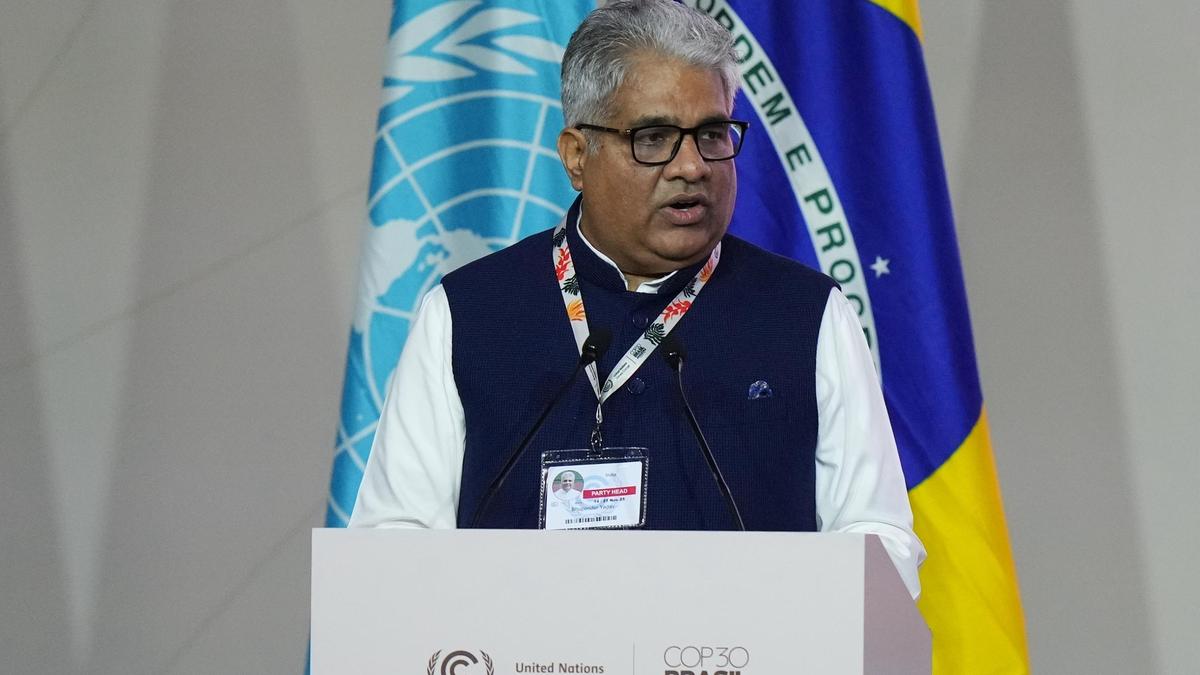Science
India to Present Updated Climate Targets at COP30 by December

India will submit its updated Nationally Determined Contribution (NDC) and its first Biennial Transparency Report (BTR) to the United Nations by the end of December 2025. This announcement was made by Environment Minister Bhupender Yadav during a meeting in Belem, Brazil, as part of the 30th Conference of Parties (COP30). As a signatory to the Paris Agreement, India is required to present an updated NDC this year, detailing its voluntary actions to reduce reliance on fossil fuels and enhance energy efficiency.
As of mid-November, over 100 countries have already submitted their updated NDCs, outlining specific measures to be implemented by 2035. For instance, the European Union aims for a 55% reduction in greenhouse gas emissions by 2030 and a potential reduction of up to 72.5% by 2035, compared to 1990 levels. Similarly, Brazil has committed to reducing its emissions by 59% to 67% by 2035, relative to 2005 levels.
Despite India’s projected growth in emissions in the coming years, the government aims to slow this increase annually. In contrast, China has pledged to decrease its economy-wide net greenhouse gas emissions by 7% to 10% from its peak, although it has not yet disclosed when it expects to reach that peak.
In its initial NDC declared in 2022, India committed to achieving a 45% reduction in emissions intensity of its GDP by 2030, compared to 2005 levels. The country also aims to have 50% of its installed power capacity from non-fossil sources and to create an additional carbon sink of 2.5 to 3 billion tonnes of CO2 equivalent through enhanced forest and tree cover by 2030. Notably, India has already met its power capacity target ahead of schedule and is reportedly on track to fulfill its other commitments.
Financial Support and Structural Changes Needed
Meeting energy efficiency targets and reducing emissions will require significant structural changes to India’s energy systems, which are often expensive. For years, India has maintained that insufficient affordable public financing hampers its ability to transition effectively. Minister Yadav emphasized that developed countries, which are largely responsible for high carbon levels in the atmosphere, are not only failing to cut their emissions quickly enough but are also hindering the economic development of developing nations.
“Developed countries must reach net zero far earlier than current target dates, fulfill their obligations under Article 9.1 of the Paris Agreement, and deliver new, additional, and concessional climate finance estimated to be in the trillions of dollars,” Yadav stated.
This will be India’s first submission of a BTR, which must be provided every two years. The BTR will include details on national inventory reports (NIR), progress toward NDCs, policies and measures, impacts of climate change, and adaptation strategies. It will also address financial and technological development needs and capacity-building support.
Broader Implications for Climate Action
Experts highlight that while the NDC is crucial, it is not the only document reflecting a country’s commitment to combat climate change. “Accessing low-cost public finance is one of the main issues that is hindering climate action,” said Vaibhav Chaturvedi, Senior Fellow at the Council on Energy, Environment and Water (CEEW). He noted that while NDCs will be updated, additional measures are necessary to meet the commitments made by developed nations to achieve global emission targets.
As COP30 progresses, the focus remains on how countries will balance their growth ambitions with their responsibilities to combat climate change effectively. India’s forthcoming updates will be closely watched as part of the global effort to address the climate crisis.
-

 World4 months ago
World4 months agoSBI Announces QIP Floor Price at ₹811.05 Per Share
-

 Lifestyle4 months ago
Lifestyle4 months agoCept Unveils ₹3.1 Crore Urban Mobility Plan for Sustainable Growth
-

 Science4 months ago
Science4 months agoNew Blood Group Discovered in South Indian Woman at Rotary Centre
-

 World4 months ago
World4 months agoTorrential Rains Cause Flash Flooding in New York and New Jersey
-

 Sports4 months ago
Sports4 months agoBroad Advocates for Bowling Change Ahead of Final Test Against India
-

 Top Stories4 months ago
Top Stories4 months agoKonkani Cultural Organisation to Host Pearl Jubilee in Abu Dhabi
-

 Science4 months ago
Science4 months agoNothing Headphone 1 Review: A Bold Contender in Audio Design
-

 Top Stories4 months ago
Top Stories4 months agoAir India Crash Investigation Highlights Boeing Fuel Switch Concerns
-

 Sports4 months ago
Sports4 months agoCristian Totti Retires at 19: Pressure of Fame Takes Toll
-

 Business4 months ago
Business4 months agoIndian Stock Market Rebounds: Sensex and Nifty Rise After Four-Day Decline
-

 Politics4 months ago
Politics4 months agoAbandoned Doberman Finds New Home After Journey to Prague
-

 Top Stories4 months ago
Top Stories4 months agoPatna Bank Manager Abhishek Varun Found Dead in Well









